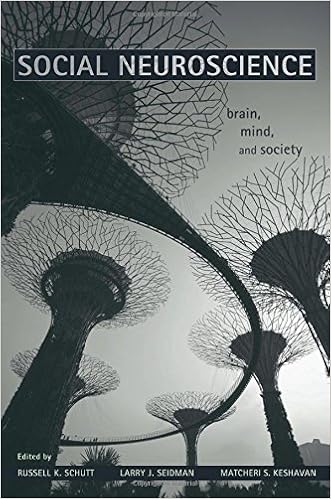
By Russell K. Schutt, Larry J. Seidman, Matcheri Keshavan MD
Human beings advanced within the corporation of others and flourish in share to their optimistic social ties. to appreciate the human mind, we needs to situate its biology within the wider context of society. to appreciate society, we should also reflect on how the brains and minds of people form interactions with different humans. Social Neuroscience bargains a finished new framework for learning the mind, human improvement, and human behavior.
In this booklet, prime researchers within the fields of neurobiology, psychiatry, psychology, and sociology elucidate the connections among mind biology and the brain’s functioning within the social global, supplying a state of the art interdisciplinary clarification of the way people imagine and act, in addition to the methods we outline and deal with pathological habit. Synthesizing the insights and views of those specialists, Social Neuroscience examines how neural tactics make the mind delicate to social event, how cognition shapes social habit, and the way social networks create a variety of responses between varied contributors to an identical environmental stimuli.
The together reinforcing connections among mind, brain, and society have profound implications for human future health, from the emotionally destructive results of serious social deprivation to the neurological impression of parental abuse and local violence. The authors discover those connections, with unique specialize in psychological health problems, together with schizophrenia―a disease characterised by means of marked social deficits during which a neurological foundation is now good established.
Read or Download Social Neuroscience: Brain, Mind, and Society PDF
Best developmental psychology books
The Developing Person Through the Life Span (8th Edition)
"The 7th version comes with major revision of cognitive improvement all through youth, revised and up to date chapters on formative years, and extra awareness to rising and early maturity. it's a thorough revision with new learn on every thing from genetics to the timing of puberty, together with mind improvement, lifestyles span problems and cultural variety.
Adolescent Psychotherapy Homework Planner
New and up-to-date assignments and routines to fulfill the altering wishes of psychological future health execs The Adolescent Psychotherapy Homework Planner, 5th Edition provides you with an array of ready-to-use, between-session assignments designed to slot nearly each healing mode. This easy-to-use sourcebook good points: 146 ready-to-copy workouts overlaying the commonest matters encountered by way of adolescent consumers together with such difficulties as mixed households, substance use, and consuming problems A quick-reference format—the interactive assignments are grouped by way of behavioral difficulties together with educational underachievement, anger keep watch over difficulties, melancholy, social nervousness, and sexual abuse professional information on how and while to take advantage of effective use of the workouts Assignments cross-referenced to The Adolescent Psychotherapy therapy Planner, 5th Edition—so you could speedy determine the best workouts for a given scenario or challenge A CD-ROM comprises the entire routines in a word-processing format—allowing you to customise them to fit your and your consumers’ designated kinds and desires
Historical and Cross-Cultural Aspects of Psychology
The e-book includes chosen contributions from the foreign workshop historic and Cross-Cultural points of Psychology. This used to be organised by way of Evelin Witruk and her crew on the collage of Leipzig in 2009, whilst Psychology in Leipzig celebrated its a hundred and thirtieth and the collage of Leipzig its 600th anniversary.
Development of perception in infancy: the cradle of knowledge revisited
The constructing toddler can accomplish all vital perceptual initiatives that an grownup can, albeit with much less ability or precision. via youngster conception study, boy or girl responses to stories permit researchers to bare perceptual competence, attempt hypotheses approximately strategies, and infer neural mechanisms, and researchers may be able to tackle age-old questions about belief and the origins of data.
- Children's Understanding of Death: From Biological to Religious Conceptions
- Transactional Analysis: A Relational Perspective
- Developmental Origins of Aggression
- Autobiography of Alexander Luria: A Dialogue with the Making of Mind
- Home Visitation Programs: Preventing Violence and Promoting Healthy Early Child Development
- Patterns of Attachment: A Psychological Study of the Strange Situation
Extra resources for Social Neuroscience: Brain, Mind, and Society
Example text
New York: Appleton. ———. (1872). The expression of emotion in men and animals. London: John Murray. T. ). (2011). The Oxford handbook of social neuroscience. New York: Oxford University Press. W. (2014). Oxytocinergic circuitry motivates group loyalty. In M. R. ), Mechanisms of social connection: From brain to group (pp. 391–407). Washington, DC: American Psychological Association. N. (1991). In search of human nature: The decline and revival of Darwinism in American social thought. New York: Oxford University Press.
2009). The evolutionary and ecological roots of human social organization. Philosophical Transactions of the Royal Society B, 364, 3289–3299. G. (1910). William Graham Sumner. American Journal of Sociology, 15, 832–835. A. (2013). Reimagining psychoses: An agnostic approach to diagnosis. Schizophrenia Research, 146, 10–16. S. (2003). Beyond phrenology, at last. Nature Reviews Neuroscience, 4, 234–239. D. (1993). Listening to Prozac: The landmark book about antidepressants and the remaking of the self.
Schizophrenia Working Group of the Psychiatric Genomics Consortium. (2014). Biological insights from 108 schizophrenia-associated genetic loci. Nature, 511, 421–427. H. (1990). Making a friend in youth. Chicago: University of Chicago Press. , & Adolphs, R. (2013). Toward a neural basis for social behavior. Neuron, 80, 816–826. Thermenos, H. , Keshavan, M. , Juelich, R. J. (2013). A review of neuroimaging studies of young relatives of persons with schizophrenia: A developmental perspective from schizotaxia to schizophrenia.



